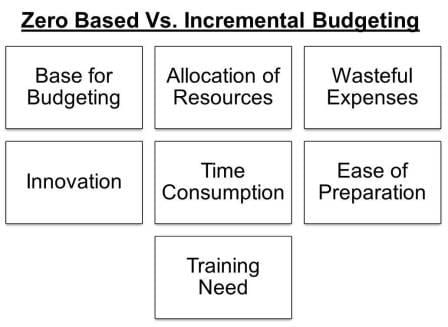Zero-based budgeting and Incremental budgeting are the two most commonly used methods of budgeting that most companies implement. Both the methods are unique and are different from each other in many ways. Before going through the differences, let us briefly understand the meaning and difference between zero-based vs incremental budgeting.
Zero-based budgeting is a budgeting method where the current year’s budget is prepared from scratch, i.e., taking the base as zero. The old and the new business activities are ranked according to their importance and based on that. Resources are allocated to each activity without considering the past budgets or achievements.
Incremental budgeting is a budgeting method where the current year’s budget is prepared by making changes in the past year’s budget. The changes are in the form of the addition or reduction of expenses to last year’s budget.
The following points will highlight the differences between zero-based budgeting and incremental budgeting.

Base for Budgeting
Zero-based budgeting is done considering the base as zero, i.e., it is done without considering the previous year’s budget. For every financial period, a fresh budget is prepared from scratch, and resources allocated to each department are justified according to the expenses of that particular period. On the other hand, incremental budgeting is different from zero-based budgeting. In the case of incremental budgeting, the current year’s budget is prepared by making changes in the previous year’s budget. In Incremental budgeting, the starting point for preparing a budget is the prior period’s budget. Taking this as a base, the current period’s budget is prepared.
Also Read: Zero Based Vs. Traditional Budgeting
Allocation of Resources
In zero-based budgeting, the budgets are prepared by allocating maximum resources to those activities which benefit the organization. The activities that are revenue-generating and critical to the business’s survival get the topmost priority, Incremental budgeting is done without giving any priority to vital activities of the business, and last year’s budget is simply adjusted considering the inflation factor.
Wasteful Expenses
Since zero-based budgeting is prepared from scratch, any resource to an activity would be allocated only after considering the risk-reward ratio and cost-benefit analysis. This eliminates all sorts of inefficiencies that are present in an activity. Thus it avoids any wasteful expense. In the case of incremental budgeting, wasteful expenses become part of the budget. The inefficiencies present in the activities are mostly ignored, and only the increase in cost forms part of the incremental budget.
Innovation
Zero-based budgeting promotes innovation in the business. As budgets are prepared right from the start for each period, it forces the management to come up with innovative ideas to lower their costs so that they can justify the allocation of resources. On the other hand, incremental budgeting leads the company into a conservative mindset. As the budgets are almost the same over the years, it does not promote any innovation in the business. Therefore, zero-based budgeting is dynamic in nature, whereas incremental budgeting is conservative.
Time Consuming
Zero-based budgeting is a time-consuming process mainly because the budget is prepared right from the start, making it a time-consuming task. On the other hand, incremental budgeting is a less time-consuming method because they are prepared by taking the previous year’s budget as a base, and changes are done in the previous year’s budget to meet the needs of the current period.
Ease of Preparation
Zero-based budgeting requires justification for allocating available resources, which can be known only after deep analysis and complex calculations. Thus, the preparation of zero-based budgets is a complicated task. In contrast, incremental budgets are easier to prepare as it does not involve any complex calculations and can be prepared by any department of the organization just by introducing the incremental changes.
Training
Managers require special skills and knowledge to prepare zero-based budgets. Only a qualified and well-trained professional can prepare such budgets. On the other hand, incremental budgets are easy to prepare. They do not require any specialized knowledge or training to prepare the budget. Any department can make an incremental budget with ease.


kindly inbox me information on zero-based budgeting in government budgeting process
its a very good review on budgeting. thank you for writing.
Enjoyed the reading thank you very much, may God bless you